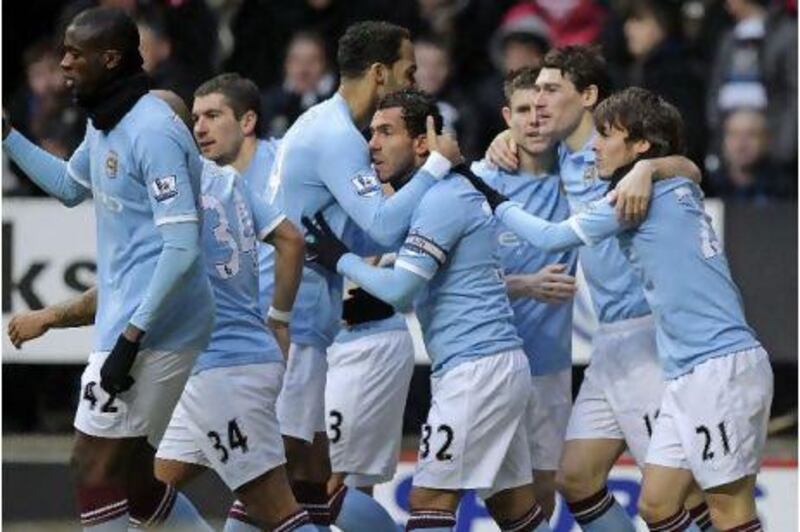Something about away wins is particularly rewarding. Perhaps it is the sense of unity they invariably require, perhaps the demonstration of character required to conquer a ground where 90 per cent of those present represent enemies. It is little wonder a prowess on the road tends to be a characteristic of champions.
By those criteria, Manchester City's victory at St James' Park was auspicious, indeed. Newcastle have proved inconsistent at home this season, but City nevertheless stormed one of the most imposing stadiums in English football.
Two goals in the first five minutes were followed by a display of resilience to ensure flurries of Newcastle attacks did not produce a point. The consequence is that City have the Premier League's best away record: most points, most wins, most goals.
The contrast is supplied both by City's immediate past and by their home form. Twelve months ago, the side Roberto Mancini inherited from Mark Hughes appeared too soft in their mentality and too generous in their defending to prosper anywhere other than the City of Manchester Stadium.
A year into his reign, the Italian is entitled to deem the strength and solidity displayed among his achievements. And yet, while Hughes's City were a guarantee of entertainment at Eastlands, Mancini's team are not.
They have struck only twice in five home league games, and one of those was an own goal. Compare that with their excellence elsewhere, where a rampant City side have celebrated 11 times in four matches, and the difference is marked. It is also apparent that they cannot be dismissed as a dull team.
But the two faces of City explain why Mancini's name is sung first, last and loudest by City's travelling fans while disgruntled murmurs are heard from those who confine their support to Eastlands.
The Italian's management may be best suited to away games, but that in itself does not account for the disparity between home and away.
A counter-attacking style is not necessarily the same as defensive; it did not preclude Jose Mourinho either from winning the title with Chelsea or from having a formidable record at Stamford Bridge.
Building from the back, as Mancini is doing, is a feature of most successful sides. A well-drilled back four and an efficient midfield trio stand City in particularly good stead on their travels. With back-to-back home games now, it is time to focus on the less impressive half of their record.
Given the pedigree of their players, it is unsurprising that opponents arrive at Eastlands intent upon damage limitation.
There is more onus on City to make the running and too often they have started slowly. That Aston Villa and Blackpool, two of the division's more open sides, are this week's visitors, could suit Mancini's men.
Despite the demoralising statistics, there is nothing radically wrong with City on their own turf. The 1-0 victory against Bolton could easily have yielded more goals, as could the fightback in a 2-1 defeat against Everton.
For their home drought to end, however, a couple of subtle but significant switches may be beneficial.
If the wingers offered genuine width, opponents would be stretched; Everton defended the width of the penalty area rather successfully. It is less of an issue on the road where the speed of a break can be the determining factor.
And Yaya Toure's deployment as the attacking midfielder has, after initial scepticism, proved an astute move in away matches where the Ivorian's passing range and rampaging runs from deep have made him a major asset; at home, however, there is a case for omitting Gareth Barry, starting Toure nearer Nigel de Jong and incorporating another attack-minded player.
Away wins show character, but victories at home show the majority of supporters the ability a side possesses. And one or two fans at Eastlands could benefit from a reminder.
***
There was much to admire in Rafael van der Vaart's glorious second goal that sealed 10-man Tottenham's win at Villa Park. There was the initial touch, deep in his own half, to release Gareth Bale, and the calm finish, steered inside Brad Friedel's far post.
In between, however, came the part that may have been the hardest for the Dutchman; the 70-yard sprint to keep him in touch with Bale and Aaron Lennon, the two roadrunners who led the counter-attack, to enable him to cap the move so stylishly.
***
Carlton Cole's wonderfully judged second goal at Fulham was notable for a couple of reasons. It earned West Ham United a rare break from propping up the Premier League.
It was also the first time that Cole, 27, had struck twice in a league game.
That is an indictment of an international striker, yet the manner of Cole's finish showed why managers such as Fabio Capello and Claudio Ranieri have selected him.






